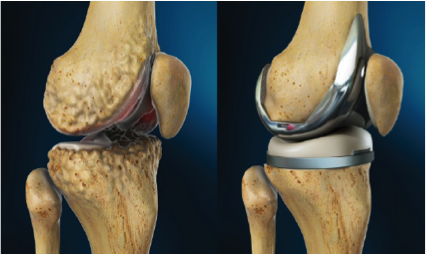
Knee pain is a common issue that affects millions of people, particularly when they grow in age. For some, conservative treatments like physical therapy, medication, or injections may offer relief. For individuals with severe knee damage or advanced arthritis, these treatments might not be effective. In such cases, total knee replacement (TKR) can be a life-changing solution.
This post explores the factors that determine whether total knee replacement is the right option for you and the conditions that may require this procedure.
Conditions That Require Knee Replacement Surgery
- Osteoarthritis (OA)
Osteoarthritis is the most common reason for considering total knee replacement. This degenerative joint disease results in the breakdown of cartilage, causing bones to rub together and leading to pain, stiffness, and swelling.
- Symptoms to Watch: Persistent knee pain, swelling, and limited range of motion, especially after prolonged activity or at rest, are signs of OA.
- When TKR Becomes Necessary: If pain becomes chronic and severe, and daily activities like walking, climbing stairs, or even sleeping are affected, a knee replacement may be the best option for relief.
- Benefits of TKR: Total knee replacement provides significant pain relief and restores function, allowing patients to resume normal activities without the limitations.
- Rheumatoid Arthritis (RA)
Rheumatoid arthritis is an autoimmune condition that causes the body’s immune system to attack the joints, leading to inflammation, pain, and eventual joint damage.
- Impact on the Knee: RA affects both knees simultaneously, leading to chronic inflammation that can cause irreversible damage to the joint structure.
- When TKR Is Recommended: If RA has caused significant cartilage damage and the pain cannot be managed with medications or other treatments, TKR can help restore knee function and alleviate discomfort.
- Specialist Care for RA Patients: The best knee TKR hospitals provide personalised care for rheumatoid arthritis patients, addressing the underlying autoimmune condition to ensure optimal recovery post-surgery.
- Post-Traumatic Arthritis
Injuries to the knee, such as fractures, ligament tears, or cartilage damage, can lead to post-traumatic arthritis, a condition that accelerates the deterioration of the knee joint.
- Progression After Injury: Over time, even seemingly minor injuries can lead to knee pain and arthritis, resulting in severe functional limitations.
- TKR as a Solution: Total knee replacement can help restore function in patients whose knee joint damage from trauma has resulted in significant pain and loss of mobility.
- Advanced Surgical Options: Knee replacement surgery at top hospitals can offer improved outcomes, particularly for patients with post-traumatic arthritis, thanks to advanced techniques and materials.
- Knee Deformity
Some individuals may experience knee deformities, such as bowing or knock-knees, due to congenital conditions, ageing, or injury. This can lead to uneven wear on the knee joint and result in pain and difficulty moving.
- Symptoms of Knee Deformity: Uneven wear on the cartilage, knee pain, and abnormal walking patterns may indicate the need for intervention.
- When TKR Is the Best Option: If deformity leads to severe knee pain and affects the ability to perform daily tasks, knee replacement can correct alignment issues and reduce discomfort.
- Comprehensive Treatment: Leading knee TKR hospitals specialise in treating knee deformities, offering tailored solutions to realign the knee joint and ensure long-term success.
- Knee Infections
Chronic knee infections or severe infections that lead to joint destruction can result in permanent damage to the knee, making it difficult to move and function.
- Causes of Knee Infections: Infections may occur after knee surgery, trauma, or as a result of other health conditions like diabetes.
- When TKR Becomes Necessary: If infection leads to bone loss or destruction of joint structures, a total knee replacement may be required to restore mobility and eliminate pain.
- Post-Infection Care: Hospitals that specialise in knee TKR offer advanced infection control measures and work to prevent infection recurrence after surgery, ensuring long-term recovery.
- Bone Tumours Affecting the Knee
In rare cases, bone tumours or other growths may affect the knee joint, leading to pain, deformity, and loss of function.
- Tumour-Related Knee Pain: A growth in the knee can cause significant discomfort and a decreased ability to bear weight or perform regular activities.
- TKR as a Treatment Option: If a tumour leads to irreversible damage to the knee joint, a total knee replacement can help replace the damaged parts of the knee and restore function.
- Oncological and Surgical Expertise: The best knee TKR centres provide multidisciplinary care, combining orthopaedic surgeons and oncologists to address both the tumour and the need for knee replacement.
- Limited Mobility and Severe Pain from Aging
As individuals age, the knee joints naturally undergo wear and tear. For some, this results in severe pain, stiffness, and reduced mobility that interferes with daily life.
- Age-Related Knee Issues: In older adults, osteoarthritis and general wear and tear can significantly impact knee function, leading to chronic pain and loss of movement.
- When TKR Is the Best Solution: For patients who experience debilitating pain and loss of function that interfere with walking, climbing stairs, and performing daily tasks, TKR provides a chance to regain mobility and improve quality of life.
- Comprehensive Pre- and Post-Surgery Care: Top knee replacement hospitals offer specialised rehabilitation programs to help elderly patients recover quickly and improve their overall knee function after surgery.
Know more about : Total Knee Replacement Surgery Recovery Tips
Conclusion
Total knee replacement (TKR) offers significant relief for patients suffering from severe knee pain and mobility limitations caused by a variety of conditions, including osteoarthritis, rheumatoid arthritis, and knee deformities.
If you are struggling with persistent knee pain that affects your quality of life, consulting with an experienced orthopaedic surgeon at a reputable knee TKR hospital like BLK-Max Super Speciality Hospital can help you determine if a knee replacement is the right choice for you.






